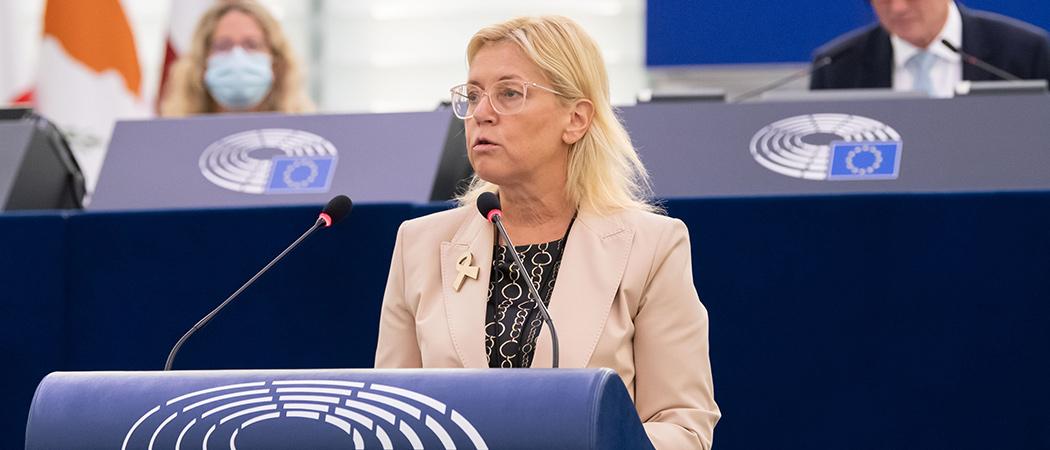Slovenian presidency warns MEPs that member states will not agree to Parliament’s proposed €305M increase for Horizon Europe and €137M for Erasmus+

Irena Drmaž, Slovenian minister for negotiations on EU budget. Photo: Twitter @EU2021SI
The European Parliament has voted through a budget proposal for 2022 that would see slight increases for research and education in Horizon Europe and Erasmus+, but with member states set on pursuing cuts they agreed in July, the prospects of more money materialising are dim.
The European Commission has proposed spending nearly €12.2 billion from the seven-year Horizon Europe research programme during 2022. However, member states argue there is not enough demand for this level of investment and have proposed a cut of €316 million, saying expenditure should be backloaded to the end of Horizon Europe, which will run until 2027.
Research associations and MEPs strongly oppose the Council cut at a time when the EU is struggling to recover from the COVID-19 pandemic. Parliament’s draft budget adds €305 million to Horizon Europe over the level proposed by the European Commission.
MEPs reversed most cuts made by the Council and thereby restored the draft budget to the level originally proposed by the Commission. The Parliament’s budget proposal includes increased funding for programmes which MEPs see as contributing to EU’s recovery from the COVID-19 pandemic.
In addition to the €305 million hike proposed for Horizon Europe, MEPs want €137 million on top of the Commission’s proposal to fund an additional 40,000 education exchanges in the Erasmus+ programme. Also, MEPs have proposed an extra €207 million for the Connecting Europe Facility, which funds sustainable transport, energy and digital networks, and €171 million for the environment and climate action LIFE programme. EU4Health has also been given a €80 million boost.
The Slovenian presidency of the Council of the EU has warned MEPs that member states will not accept these increases.
Irena Drmaž, Slovenian minister for negotiations on EU budget, told MEPs this week that the Council recognises the EU research programme will play a vital role in economic recovery and the green and digital transitions, but member states want to keep some cash in reserve for unforeseen problems in security, humanitarian aid and migration, and are against spending the maximum possible amounts in the first years of the multiannual EU budget. “The Council cannot accept the full use of the margins in almost all headings,” said Drmaž.
“While the Council fully acknowledges the importance of programmes such as EU4Health and Erasmus+, these programmes have already been reinforced in the draft budget, therefore, a further increase of €300 million does not seem reasonable,” said Drmaž.
MEPs also want €408 million that was allocated to the previous EU research programme, Horizon 2020, but was not disbursed, to go into Horizon Europe. They propose that half this sum should be routed to the health cluster in order to make sure 2022 expenditure on health research is at least equal to that in the 2021 budget.
Drmaž said the Council is “surprised” by this request because the Horizon 2020 underspend was not forecast by the Commission and was not included in the trilateral agreement on the EU multiannual budget for 2021-27.
Disappointed MEPs
Ever since the Council made its position clear in July, MEPs have been voicing their disappointment.
“I was very disappointed with the Council's decision, of course, to pare back on some of the key most important issues like innovation, research, the digital economy, and other very significant areas,” said Irish liberal MEP Billy Kelleher.
Budget rapporteur Karlo Resller said it is a mistake to cut successful EU programmes such as Horizon Europe at a time when policymakers in Brussels are declaring their commitment to the digital and green transitions. “The key element of our position is undoubtedly the restoration of the arbitrary cuts and reinforcement of lines that have an added value for Europeans, that have an excellent implementation rate, and also that have the operational capacity to absorb the additional appropriations,” Ressler said.
MEPs will now negotiate with the Council, hoping to reach an agreement before the 22 November plenary session.
A deal requires the endorsement of the majority of member states and the final green light from the MEPs. If there is no agreement, the Commission will have to present a new draft annual budget, a process that could drag on into 2022.





 A unique international forum for public research organisations and companies to connect their external engagement with strategic interests around their R&D system.
A unique international forum for public research organisations and companies to connect their external engagement with strategic interests around their R&D system.